|
|
|
Sort Order |
|
|
|
Items / Page
|
|
|
|
|
|
|
| Srl | Item |
| 1 |
ID:
132540
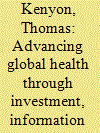

|
|
|
|
|
| Publication |
2014.
|
| Summary/Abstract |
The past decade has witnessed unprecedented levels of investment and engagement in global health spurred by the global HIV/AIDS crisis, the development of the Millennium Development Goals, momentum in polio eradication, and global outbreaks of infectious diseases such as SARS with its US$40 billion cost to society. Characterized by a sense of urgency, pragmatism, and opportunity, global health services and public health systems are being advanced to respond to rapidly expanding demands with dramatic results. However, much more remains to be done. After a decade in emergency mode, the next phase of global health work requires an even more precise approach and smarter investments. Many "donor" nations and organizations have tightened their belts in response to the recent economic downturn, while at the same time increasing the numbers of "recipient" countries, and are now better able to invest more of their own resources to benefit and protect their own citizens. In this climate, global health investments in programs and innovations must be better targeted and better informed by strategic information more than four-fold from US $6.7 billion in 1993 to US $28.4 billion in 2011. Accompanying this investment was a striking decline in mortality in children under five years of age from 12.6 million deaths in 1990 to 6.6 deaths million in 2012. Improvements in health are not the only positive outcome of these investments. The same Commission concluded that global health is a smart investment - for every dollar invested in health, it can be expected that there will be a 10-20 fold return in economic benefit to society. Healthier people are more productive and contribute back to the economy. Healthier people also lower health care costs, naturally, by requiring less care.
|
|
|
|
|
|
|
|
|
|
|
|
|
|
|
|
| 2 |
ID:
132541
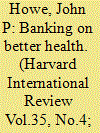

|
|
|
|
|
| Publication |
2014.
|
| Summary/Abstract |
HIV is no longer a death sentence" - that hopeful declaration-which would have been unthinkable even a decade ago- has now become a cliché by repetition whenever experts, physicians, academics and journalists gather to chart progress in fighting the disease and to set goals for the future. But for many people, sadly, that statement is not actually true. There remains no cure for the disease, and not everyone can get access to the anti-retrovirals (ARVs) that have done so much to help so many. This reflects the painful truth that poverty remains a major impediment to good health in the developing and even the developed world.
|
|
|
|
|
|
|
|
|
|
|
|
|
|
|
|
| 3 |
ID:
132533


|
|
|
|
|
| Publication |
2014.
|
| Summary/Abstract |
The rapid manner in which social protection systems have gained prominence and political support in development and poverty reduction discourse over the past few years is practically without precedent, leading some to consider it "a quiet revolution." Latin American countries have been at the forefront of this "revolution," with political support for government-funded social protection mechanisms going hand in hand with a growing discourse in favor of a human rights approach in development agendas. This approach is in line with the constitutions of most Latin American countries (including Argentina, Bolivia, Ecuador, Colombia, Guatemala, and Brazil), which enshrine a long list of human rights and explicitly recognize that these norms impose limits on state power. This constitutional protection of rights includes not only civil and political rights, but a wide range of economic, social, and cultural rights (see e.g. the constitutions of Colombia, Brazil, and Costa Rica), the prohibition of discrimination (on the grounds of gender, age, ethnicity, disability, sexual orientation, health status, and others), and the obligation to take affirmative action to protect groups that have suffered from structural discrimination (see e.g. constitution of Ecuador).
|
|
|
|
|
|
|
|
|
|
|
|
|
|
|
|
| 4 |
ID:
132536
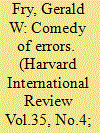

|
|
|
|
|
| Publication |
2014.
|
| Summary/Abstract |
Political crises are nothing new for Thailand. Since becoming a constitutional monarchy in 1932, the country has faced numerous political crises, including a 1973 student revolution to overthrow a military dictatorship, the storming of Thammasat University and the installation of an extremely right-wing government in 1976, and the people power victory over General Suchinda in 1992. In September 2006, a military coup deposed the former prime minister, Dr. Thaksin Shinawatra. In retaliation against the coup, Thaksin supporters in 2006 formed the United Front for Democracy against Dictatorship (UDD), a political pressure group whose supporters are commonly called Red Shirts.
|
|
|
|
|
|
|
|
|
|
|
|
|
|
|
|
| 5 |
ID:
132547
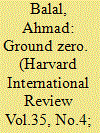

|
|
|
|
|
| Publication |
2014.
|
| Summary/Abstract |
The signing of the proposed bilateral security agreement between the US led coalition and the Afghan government is nowhere near sight, even though the declared deadline for the complete withdrawal of coalition-led forces by the end of 2014 is drawing closer everyday. This has led to a feeling of growing pessimism amongst the general public as well as those at the helm of public affairs; there is ample historic evidence to support this phenomenon. It took barely a few years for the South Vietnamese regime to fall into the hands of the North Vietnamese after the departure of US troops and drawing up on financial support, the fall of Dr. Najibullah's pro- Soviet Kabul regime to the Taliban was no different a story. While the Soviet invasion of Afghanistan was successfully thwarted when Soviet troops withdrew a decade later by an alliance whose three main partners were Saudi Arabia, Pakistan and the United States, it was the latter's unceremonious and almost sudden withdrawal from this theatre of war, which sent this region into a socio-political mayhem, which continues to date with no immediate end in sight.
|
|
|
|
|
|
|
|
|
|
|
|
|
|
|
|
| 6 |
ID:
132545
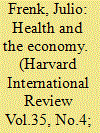

|
|
|
|
|
| Publication |
2014.
|
| Summary/Abstract |
W e are at a critical juncture in efforts to promote development around the world. If we are to meet the challenges of our times we need new forms of thinking and acting. The key to deal with a changing and increasingly complex reality is integration, and the starting point for integration is the acknowledgment of the crucial notion that social and economic policy are really two sides of the same coin. The recent evolution of global health epitomizes this idea. Indeed, many observers have remarked that the past decade can be seen as a new era in global health. The most important feature of this is the fact that health matters have stopped being the exclusive concern of domain experts. Instead, health has come to occupy a central place in the most pressing dimensions of the global agenda: economic development, national security, democratic governance, and human rights. In this context
|
|
|
|
|
|
|
|
|
|
|
|
|
|
|
|
| 7 |
ID:
132544
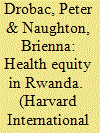

|
|
|
|
|
| Publication |
2014.
|
| Summary/Abstract |
This April, Rwanda will commemorate the 20th anniversary of one of the last century's greatest human tragedies, the 1994 genocide that took the lives of one million Tutsis and moderate Hutus in just one hundred days. As the global community turns its attention to Rwanda on this occasion, they will find a country radically different from the Rwanda of the past. The new Rwanda is a stable and increasingly prosperous country, one where life expectancy has doubled since the difficult aftermath of the genocide. The government's commitment to equity has catalyzed rapid and widespread development, largely by creating opportunity for its poorest citizens. Meanwhile, the health sector's pioneering efforts in health care delivery have drawn global attention. With strong leadership, smart partnerships and innovative programs, Rwanda is forging a new pathway for development.
|
|
|
|
|
|
|
|
|
|
|
|
|
|
|
|
| 8 |
ID:
132546
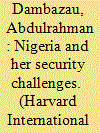

|
|
|
|
|
| Publication |
2014.
|
| Summary/Abstract |
Nigeria's importance to global security hinges on the fact she is not only the most populous country in Africa, but also strategically located in a region (Gulf of Guinea) that is a major source of the world's oil. From the 1960 Congo crisis when Nigeria began contributing troops for international peacekeeping, the country has maintained consistency as a key player in both the United Nations and regional peacekeeping missions, thus contributing to world peace. However, Nigeria is currently facing serious internal security challenges, the most serious ones being the Boko Haram insurgency in the northeastern states of Borno, Yobe and Adamawa; and the Niger Delta militancy and piracy in the south-south geopolitical zone, comprising Bayelsa, Delta and Rivers. Additionally, there are security challenges posed by violent crimes, ethno-religious conflicts, resource-based conflicts, trans-border criminal activities, and election-induced violence. All these security challenges undoubtedly pose some threats to the social, economic and political stability of not only Nigeria, but also of the African continent, especially the West African sub-region, where more than half the population comes from Nigeria. While several factors could have contributed to Nigeria's security situation today, there is no doubt that poor governance and lack of effective leadership at all levels of governance are central in attempting to explain the problem. About fourteen years after the return of democracy in 1999, Nigeria's democratic transition does not appear to be consolidating due to lack of transparency, accountability, rule of law, and the genuine demonstration of leadership capacity to protect fundamental human rights. It is also evident that most of the key government institutions are weak, enabling corruption to thrive with impunity. This article examines the current security situation in Nigeria; the several factors contributing to it; and suggests that through effective leadership and good governance the situation could be remedied in order to arrest the apparent slide into state fragility and failure.
|
|
|
|
|
|
|
|
|
|
|
|
|
|
|
|
| 9 |
ID:
132538
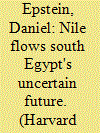

|
|
|
|
|
| Publication |
2014.
|
| Summary/Abstract |
As US citizens celebrated their independence and self-rule on July 4, 2013, they opened their newspapers to find that Egyptians had surrendered theirs. The previous day, amid impassioned protests across the country against the Muslim Brotherhood-led government, the Egyptian Armed Forces removed President Mohammad Morsi from power. For a time, the move dominated headlines. Columnists, academics, and statesmen debated the ethics and ramifications of the coup. But soon, the world moved on. Despite Egypt's vital ongoing struggle to build a nation, coverage of the effort moved out of the mainstream. Now, almost nine months later, Egypt deserves a second look. In late January 2011, Hosni Mubarak, who had governed Egypt since 1981, was overthrown after weeks of mass protest across the country. In the November elections the Muslim Brotherhood, previously illegal, was swept into power with 52 percent of the vote. In June 2012, Muhammad Morsi, a member of the Brotherhood, became the first freely elected President in Egyptian history. Egypt's (seemingly) successful transition to civilian rule drew accolades from the international community. Another victory for democracy. But things were not as rosy as they seemed.
|
|
|
|
|
|
|
|
|
|
|
|
|
|
|
|
| 10 |
ID:
132535
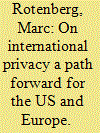

|
|
|
|
|
| Publication |
2014.
|
| Summary/Abstract |
The United States and its closest allies may be on a collision course over the future of privacy in the networked world. Whether leaders are able to find a policy solution will require that they understand the significance of the recent NSA disclosure as well as the development of modern privacy law. Long before a former NSA contractor spilled the secrets about the scope of the NSA's global surveillance, foreign governments worried about the ability of the United States to monitor those living in their countries. The increasing automation of personal information and the technological advantage that the United States enjoyed over other nations was already seen as a problem in the late 1960s. The concerns only increased as Internet-based commerce gave rise to the vast collection and storage
|
|
|
|
|
|
|
|
|
|
|
|
|
|
|
|
| 11 |
ID:
132543


|
|
|
|
|
| Publication |
2014.
|
| Summary/Abstract |
The link between poverty and health is well established worldwide, but the connection is both direct (lack of access to health services) and indirect (lack of awareness about health-related issues). Poverty helps produce ailments and ill-health pushes people towards poverty. It is a vicious cycle. Socioeconomic conditions create situations that can lead to ill-health. Health emergencies can cost individuals and families, dearly aggravating poverty. According to the World Bank, 25 percent of hospitalized people in India fall below the poverty line. In Pakistan, little research based on empirical data has been found to understand the link between health and poverty. However, a World Bank study found out that approximately four percent of the population in Pakistan falls into poverty due to health shocks each year.
|
|
|
|
|
|
|
|
|
|
|
|
|
|
|
|
| 12 |
ID:
132542
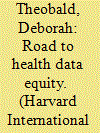

|
|
|
|
|
| Publication |
2014.
|
| Summary/Abstract |
It is no secret in healthcare today that electronic data capture leads to better policies, better programs, and better outcomes. This understanding paved the way for Electronic Medical Record (EMR) solutions which generate complete records of clinical patient encounters, supporting evidence-based treatments, strategic quality management initiatives, and clinical outcomes reporting. Each of these capabilities gives clinical and administrative healthcare staff actionable data for improving patient care. EMR solutions are equally important in remote and underserved areas as they are in wealthy states and nations, due to the fact that health disparities most notably affect subpopulations. According to a 2012 report from the Agency for Healthcare Research and Quality, "racial and ethnic minorities and poor people often face more barriers to care and receive poorer quality of care when they can get it." EMRs can thus provide a benchmarking tool to drive quality improvements, and identify these trends to ensure that local and national authorities can improve care for subpopulations.
|
|
|
|
|
|
|
|
|
|
|
|
|
|
|
|
| 13 |
ID:
132532
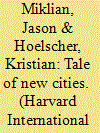

|
|
|
|
|
| Publication |
2014.
|
| Summary/Abstract |
The global shift from rural to urban living will be the most important demographic transformation of the 21st century. All great shifts create the opportunity for great fortunes, especially for those with audacious visions who are positioned to capitalize on them. Indian industrialist Ajit Gulabchand runs Hindustan Construction Company (HCC), which is responsible for some of the country's most iconic infrastructure projects. In what might be the single biggest bet in the history of Indian real estate, Gulabchand has staked HCC's future - and his own family fortune - on a cluster of five planned cities perched along artificial fjords about four hours east of Mumbai. He calls it Lavasa. 300 million people are projected to move into India's already overcrowded cities over the next quarter-century. Lavasa is Gulabchand's US$6 billion dollar attempt to capitalize on this demographic shift - and turn a profit in the process. He even modeled Dasve, the first of Lavasa's five cities, after Portofino on the Italian Riviera. Lavasa's sales team speaks of a "stirring adventure", complete with French lessons and rock climbing, for the 300,000 residents that it hopes to attract. With Indian cities feeling increasingly like pressure cookers, Lavasa's promise of clean air, sidewalks, and personal space attracted huge investments.
|
|
|
|
|
|
|
|
|
|
|
|
|
|
|
|
| 14 |
ID:
132539


|
|
|
|
|
| Publication |
2014.
|
| Summary/Abstract |
On September 18th, Scotland's electorate will head to the polls to answer the question: "Should Scotland be an independent country?" The date has been selected with special care and consideration to mark the 700th anniversary of the Battle of Bannockburn, a legendary victory in the First War of Scottish Independence. The referendum will also closely follow the 2014 Commonwealth Games, to be held in Glasgow (the country's largest city). The Scottish National Party, the primary backer of the referendum, hopes that all of these factors will work together to ignite a feeling of Scottish pride and nudge people to vote "yes" in the referendum. This vote on the future of the United Kingdom is significant not only in its potential to divide one of the world's oldest united territories, but also in the precedent that it sets for other independence and right-wing movements throughout Europe.
|
|
|
|
|
|
|
|
|
|
|
|
|
|
|
|
| 15 |
ID:
132548
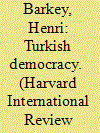

|
|
|
|
|
| Publication |
2014.
|
| Summary/Abstract |
Turkey's ruling Justice and Development Party (AKP), or in Turkish, Adalet ve Kalk?nma Partisi, came to power in late 2002 and went to win two more elections in 2007 and 2011, gaining a larger and larger share of the vote. No government since the 1950s had managed to achieve such a feat. A year ago, the AKP and Prime Minister Recep Tayyip Erdogan seemed poised to extend their dominance of Turkish politics for a decade or longer. A year later, however, in the aftermath of protests in early summer and a massive corruption scandal, uncertainty reigns. Erdogan and his party appear to have become unhinged. In fits of complete paranoia, they and their supporters have started to accuse everyone, especially Western allies and interests, for attempting to overthrow them.
Justice and Development Party - AKP
|
|
|
|
|
|
|
|
|
|
|
|
|
|
|
|
|
|
|
|
|